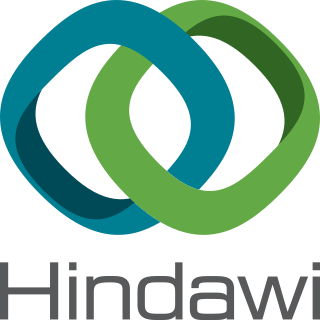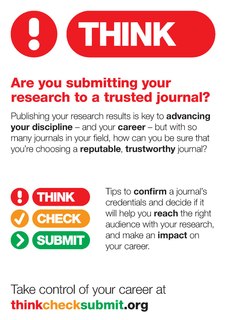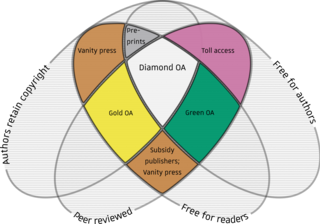Related Research Articles

Academic publishing is the subfield of publishing which distributes academic research and scholarship. Most academic work is published in academic journal articles, books or theses. The part of academic written output that is not formally published but merely printed up or posted on the Internet is often called "grey literature". Most scientific and scholarly journals, and many academic and scholarly books, though not all, are based on some form of peer review or editorial refereeing to qualify texts for publication. Peer review quality and selectivity standards vary greatly from journal to journal, publisher to publisher, and field to field.

A learned society is an organization that exists to promote an academic discipline, profession, or a group of related disciplines such as the arts and science. Membership may be open to all, may require possession of some qualification, or may be an honour conferred by election.

Open access (OA) is a set of principles and a range of practices through which research outputs are distributed online, free of access charges or other barriers. With open access strictly defined, or libre open access, barriers to copying or reuse are also reduced or removed by applying an open license for copyright.
BioMed Central (BMC) is a United Kingdom-based, for-profit scientific open access publisher that produces over 250 scientific journals. All its journals are published online only. BioMed Central describes itself as the first and largest open access science publisher. It was founded in 2000 and has been owned by Springer, now Springer Nature, since 2008.

Google Scholar is a freely accessible web search engine that indexes the full text or metadata of scholarly literature across an array of publishing formats and disciplines. Released in beta in November 2004, the Google Scholar index includes peer-reviewed online academic journals and books, conference papers, theses and dissertations, preprints, abstracts, technical reports, and other scholarly literature, including court opinions and patents.

Hindawi is a publisher of peer-reviewed, open access, scientific journals currently active in scientific, technical, and medical (STM) literature. It was founded in 1997 in Cairo, Egypt, but purchased in 2021 by John Wiley & Sons, a publishing company based in the United States. The company has its headquarters in London, an office in Cairo, and a virtual office address in New York City.
A hybrid open-access journal is a subscription journal in which some of the articles are open access. This status typically requires the payment of a publication fee to the publisher in order to publish an article open access, in addition to the continued payment of subscriptions to access all other content. Strictly speaking, the term "hybrid open-access journal" is incorrect, possibly misleading, as using the same logic such journals could also be called "hybrid subscription journals". Simply using the term "hybrid access journal" is accurate.
Scientific Research Publishing (SCIRP) is a predatory academic publisher of open-access electronic journals, conference proceedings, and scientific anthologies that are considered to be of questionable quality. As of December 2014, it offered 244 English-language open-access journals in the areas of science, technology, business, economy, and medicine.

The Open Access Scholarly Publishing Association (OASPA) is a non-profit trade association of open access journal and book publishers. Having started with an exclusive focus on open access journals, it has since expanded its activities to include matters pertaining to open access books and open scholarly infrastructure.
Academic journal publishing reform is the advocacy for changes in the way academic journals are created and distributed in the age of the Internet and the advent of electronic publishing. Since the rise of the Internet, people have organized campaigns to change the relationships among and between academic authors, their traditional distributors and their readership. Most of the discussion has centered on taking advantage of benefits offered by the Internet's capacity for widespread distribution of reading material.

PeerJ is an open access peer-reviewed scientific mega journal covering research in the biological and medical sciences. It is published by a company of the same name that was co-founded by CEO Jason Hoyt and publisher Peter Binfield, with initial financial backing of US$950,000 from O'Reilly Media's O'Reilly AlphaTech Ventures, and later funding from Sage Publishing.

Predatory publishing, also write-only publishing or deceptive publishing, is an exploitative academic publishing business model that involves charging publication fees to authors without checking articles for quality and legitimacy, and without providing editorial and publishing services that legitimate academic journals provide, whether open access or not. The phenomenon of "open access predatory publishers" was first noticed by Jeffrey Beall, when he described "publishers that are ready to publish any article for payment". However, criticisms about the label "predatory" have been raised. A lengthy review of the controversy started by Beall appears in The Journal of Academic Librarianship.
An article processing charge (APC), also known as a publication fee, is a fee which is sometimes charged to authors. Most commonly, it is involved in making a work available as open access (OA), in either a full OA journal or in a hybrid journal. This fee may be paid by the author, the author's institution, or their research funder. Sometimes, publication fees are also involved in traditional journals or for paywalled content. Some publishers waive the fee in cases of hardship or geographic location, but this is not a widespread practice. An article processing charge does not guarantee that the author retains copyright to the work, or that it will be made available under a Creative Commons license.
ScienceOpen is a website. It is freely accessible for all and offers hosting and promotional services within the platform for publishers and institutes. The organization is based in Berlin and has a technical office in Boston. It is a member of CrossRef, ORCID, the Open Access Scholarly Publishers Association, STM Association and the Directory of Open Access Journals. The company was designated as one of “10 to Watch” by research advisory firm Outsell in its report “Open Access 2015: Market Size, Share, Forecast, and Trends.”
Glossa: A Journal of General Linguistics is a peer-reviewed open access academic journal covering general linguistics. It was established in 2016. The editor-in-chief is Johan Rooryck. The journal is funded by LingOA and the Open Library of Humanities.
Algebraic Combinatorics is a peer-reviewed diamond open access mathematical journal specializing in the field of algebraic combinatorics. Established in 2018, the journal is published by the Centre Mersenne.

Open access to scholarly communication in Germany has evolved rapidly since the early 2000s. Publishers Beilstein-Institut, Copernicus Publications, De Gruyter, Knowledge Unlatched, Leibniz Institute for Psychology Information, ScienceOpen, Springer Nature, and Universitätsverlag Göttingen belong to the international Open Access Scholarly Publishers Association.

Scholarly communication of the Netherlands published in open access form can be found by searching the National Academic Research and Collaborations Information System (NARCIS). The web portal was developed in 2004 by the Data Archiving and Networked Services of the Netherlands Organisation for Scientific Research and Royal Netherlands Academy of Arts and Sciences.
Plan S is an initiative for open-access science publishing launched in 2018 by "cOAlition S", a consortium of national research agencies and funders from twelve European countries. The plan requires scientists and researchers who benefit from state-funded research organisations and institutions to publish their work in open repositories or in journals that are available to all by 2021. The "S" stands for "shock".

Diamond open access refers to academic texts published/distributed/preserved with no fees to either reader or author. Alternative labels include platinum open access, non-commercial open access, cooperative open access or, more recently, open access commons. While these terms were first coined in the 2000s and the 2010s, they have been retroactively applied to a variety of structures and forms of publishing, from subsidized university publishers to volunteer-run cooperatives that existed in prior decades.
References
- ↑ Wilson, Mark (2018-06-20). "Introducing the Free Journal Network – community-controlled open access publishing". Impact of Social Sciences. Retrieved 2019-06-24.
- ↑ Wilson, Mark C. (2018-08-01). "Free and Fair Open Access Journals: Flipping, Fostering, Founding". Notices of the American Mathematical Society. 65 (7): 1. doi: 10.1090/noti1695 . ISSN 0002-9920.
- ↑ "New Networks for Academic-Led Publishing: Interview with Mark C. Wilson". blog.scholasticahq.com. Retrieved 2019-06-25.
- ↑ "Hybrid vs APC fee-based vs no-fee OA (diamond)". Publishing Reform Forum. Retrieved 2020-08-02.
- ↑ By (2017-06-01). "Diamond Open Access, Societies and Mission". The Scholarly Kitchen. Retrieved 2019-06-24.
- ↑ "FJN acceptance criteria". freejournals.org. Retrieved 2019-06-25.